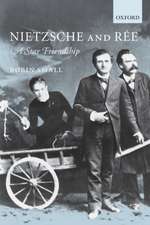Leibniz and the English-Speaking World: The New Synthese Historical Library, cartea 62
Editat de Pauline Phemister, Stuart Brownen Limba Engleză Hardback – 30 mai 2007
In addition to an introductory overview there are fourteen original and previously unpublished essays considering Leibniz’s connections with his English-speaking contemporaries and near contemporaries as well as the later reception of his thought in Anglo-American philosophy. Some of the papers shed new light on familiar topics, including the influence of Hobbes on Leibniz, his relations with Locke and the well-publicised controversy with Samuel Clarke. Others chart less familiar territory, including Leibniz’s connections with Boyle and Berkeley, Wilkins and Dalgarno. And others still break new ground in considering Leibniz’s connections with John Wallis and Margaret Cavendish. There are four concluding papers on the later reception of Leibniz’s philosophy in the English-speaking world, including two on Bertrand Russell and Leibniz, and two on the reception of Leibniz by American philosophers, Peirce and Loemker.
| Toate formatele și edițiile | Preț | Express |
|---|---|---|
| Paperback (1) | 639.08 lei 6-8 săpt. | |
| SPRINGER NETHERLANDS – 30 noi 2010 | 639.08 lei 6-8 săpt. | |
| Hardback (1) | 645.28 lei 6-8 săpt. | |
| SPRINGER NETHERLANDS – 30 mai 2007 | 645.28 lei 6-8 săpt. |
Din seria The New Synthese Historical Library
- 18%
 Preț: 950.52 lei
Preț: 950.52 lei - 18%
 Preț: 949.73 lei
Preț: 949.73 lei - 18%
 Preț: 946.24 lei
Preț: 946.24 lei - 18%
 Preț: 953.82 lei
Preț: 953.82 lei - 20%
 Preț: 1618.07 lei
Preț: 1618.07 lei - 15%
 Preț: 643.00 lei
Preț: 643.00 lei - 18%
 Preț: 955.56 lei
Preț: 955.56 lei - 15%
 Preț: 644.82 lei
Preț: 644.82 lei - 18%
 Preț: 1387.55 lei
Preț: 1387.55 lei - 18%
 Preț: 955.56 lei
Preț: 955.56 lei - 18%
 Preț: 951.47 lei
Preț: 951.47 lei - 15%
 Preț: 637.46 lei
Preț: 637.46 lei - 15%
 Preț: 644.63 lei
Preț: 644.63 lei - 18%
 Preț: 947.32 lei
Preț: 947.32 lei - 15%
 Preț: 644.49 lei
Preț: 644.49 lei - 15%
 Preț: 645.47 lei
Preț: 645.47 lei - 18%
 Preț: 953.82 lei
Preț: 953.82 lei - 18%
 Preț: 958.38 lei
Preț: 958.38 lei - 15%
 Preț: 639.25 lei
Preț: 639.25 lei - 15%
 Preț: 638.89 lei
Preț: 638.89 lei - 18%
 Preț: 953.65 lei
Preț: 953.65 lei - 18%
 Preț: 952.26 lei
Preț: 952.26 lei - 18%
 Preț: 950.52 lei
Preț: 950.52 lei - 18%
 Preț: 1225.28 lei
Preț: 1225.28 lei - 15%
 Preț: 646.11 lei
Preț: 646.11 lei
Preț: 645.28 lei
Preț vechi: 759.15 lei
-15% Nou
Puncte Express: 968
Preț estimativ în valută:
123.47€ • 129.26$ • 102.17£
123.47€ • 129.26$ • 102.17£
Carte tipărită la comandă
Livrare economică 05-19 aprilie
Preluare comenzi: 021 569.72.76
Specificații
ISBN-13: 9781402052422
ISBN-10: 1402052421
Pagini: 268
Ilustrații: XVI, 250 p.
Dimensiuni: 155 x 235 x 16 mm
Greutate: 0.55 kg
Ediția:2007
Editura: SPRINGER NETHERLANDS
Colecția Springer
Seria The New Synthese Historical Library
Locul publicării:Dordrecht, Netherlands
ISBN-10: 1402052421
Pagini: 268
Ilustrații: XVI, 250 p.
Dimensiuni: 155 x 235 x 16 mm
Greutate: 0.55 kg
Ediția:2007
Editura: SPRINGER NETHERLANDS
Colecția Springer
Seria The New Synthese Historical Library
Locul publicării:Dordrecht, Netherlands
Public țintă
ResearchCuprins
Leibniz and the English-Speaking World.- Leibniz’s Debt to Hobbes.- Two Opponents of Material Atomism.- Dalgarno, Wilkins, Leibniz and the Descriptive Nature of Metaphysical Concepts.- ‘‘Un de mes amis’’.- Leibniz and Robert Boyle.- Leibniz and the Cambridge Platonists.- Leibniz’s Nouveaux Essais.- Leibniz, Locke, and the Epistemology of Toleration.- ‘‘Is the Logic in London Different from the Logic in Hanover?’’.- The Harmony of the Leibniz-Berkeley Juxtaposition.- Synechism and Monadology.- How did Bertrand Russell make Leibniz into a ‘‘Fellow Spirit’’?*.- Leibniz and Russell.- Leibniz and the Personalism of L. E. Loemker.
Textul de pe ultima copertă
These essays comprise a first attempt to assess overall the attention awarded to Leibniz’s philosophy in the English-speaking world in his own time and up to the present day.
In addition to an introductory overview there are fourteen original and previously unpublished essays considering Leibniz’s connections with his English-speaking contemporaries and near contemporaries as well as the later reception of his thought in Anglo-American philosophy. Some of the papers shed new light on familiar topics, including the influence of Hobbes on Leibniz, his relations with Locke and the well-publicised controversy with Samuel Clarke. Others chart less familiar territory, including Leibniz’s connections with Boyle and Berkeley, Wilkins and Dalgarno. And others still break new ground in considering Leibniz’s connections with John Wallis and Margaret Cavendish. There are four concluding papers on the later reception of Leibniz’s philosophy in the English-speaking world, including two on Bertrand Russell and Leibniz, and two on the reception of Leibniz by American philosophers, Peirce and Loemker.
Caracteristici
Explores connections between Leibniz and his British/Irish contemporaries Sheds new light on Leibniz's philosophy and that of his contemporaries Considers the reception of Leibniz in Britain and America
















